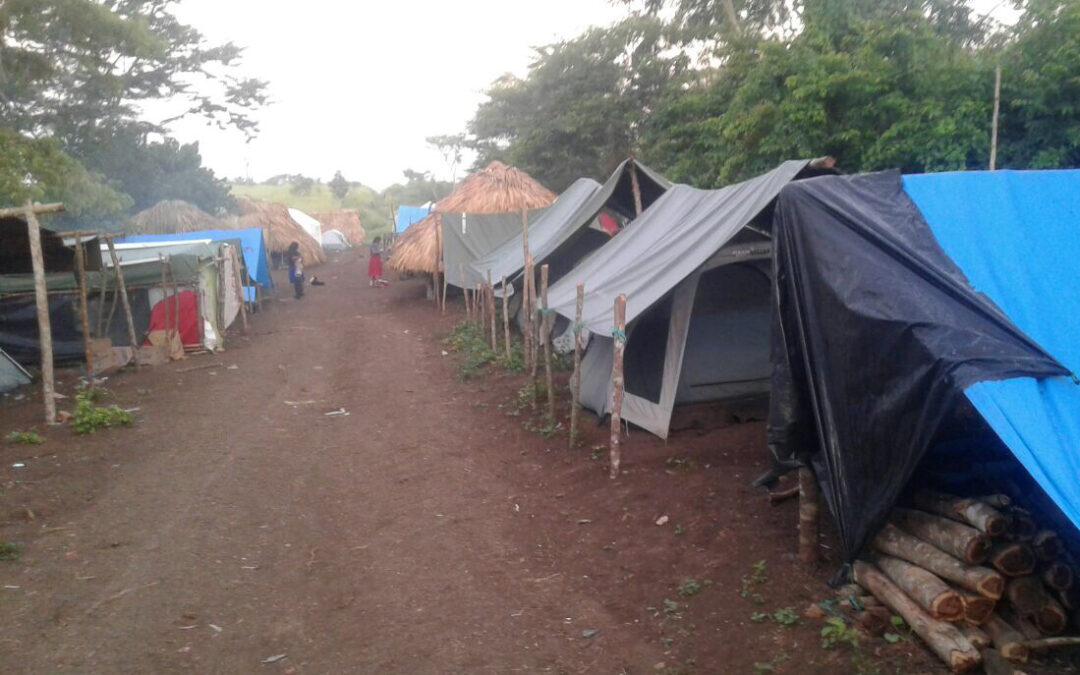
Jul 26, 2018 | Noticias
Falta de atención médica por parte del Estado de Guatemala provoca la muerte de niña, 30 horas después de nacida el 24 de julio.
La CIJ visitó el 25 de julio del presente año a la comunidad de “Laguna Larga”, víctima de desalojo forzoso hace ya más de un año.
Las personas desplazadas, que actualmente viven en la circunscripción de El Desengaño, municipio de Candelaria, Estado de Campeche, a la intemperie en carpas y “champas” en una zona rural de la franja fronteriza entre Guatemala y México, continúan en condiciones inhumanas y en una situación de riesgo, que pone en peligro su vida e integridad.
El 8 de septiembre de 2017, la Comisión Interamericana de Derechos Humanos (CIDH) decretó medidas cautelares a favor de los Pobladores desalojados y desplazados de la comunidad Laguna Larga (Resolución 36/2017, Medidas Cautelares No. 412-17), instando a las autoridades guatemaltecas a adoptar las “medidas necesarias para proteger los derechos a la vida y la integridad personal de las personas beneficiarias, a través de medidas dirigidas a mejorar, entre otros aspectos, las condiciones sanitarias y de salud, en especial de los niños, niñas, mujeres y personas mayores”.
Hasta la fecha las autoridades guatemaltecas no han acatado las medidas cautelares.
La CIJ pudo constatar que la única medida adoptada por el Estado de Guatemala ha sido la asignación a la comunidad desplazada de dos maestras para impartir clases a los niños.
No obstante, la CIJ pudo constatar igualmente que las instalaciones educativas son precarias y demasiado calientes y obscuras, lo cual dificulta la impartición de clases.
Ninguna medida de orden sanitario o en materia de salud ha sido implementada por las autoridades guatemaltecas.
El pasado 24 de julio, una niña murió apenas treinta horas después de nacida, aparentemente, por falta de atención médica.
Igualmente ninguna de las medidas cautelares relativas a la alimentación, acceso al agua potable y vivienda, ha sido atendida por las autoridades guatemaltecas.
La CIJ expresa su honda preocupación por el hecho de que el Estado de Guatemala no haya cumplido ninguno de los requerimientos de la CIDH y que, después de un año, los derechos a la vida e integridad personal de los pobladores desplazados de la Comunidad Laguna Larga se encuentren en una situación de gravedad y urgencia de riesgo de un daño irreparable.
Ante la inacción de las autoridades guatemaltecas, los miembros de “Laguna Larga”, con el apoyo de organizaciones no gubernamentales, tanto mexicanas como guatemaltecas, han logrado implementar varios proyectos para abastecerse de agua potable, energía eléctrica, alimentación y salud.
No obstante, la CIJ pudo constatar que toda esta importante ayuda humanitaria que “Laguna Larga” ha recibido de parte de la sociedad civil, resulta insuficiente dada la gravedad de la crisis.
Si bien el esfuerzo y el trabajo desplegado por los miembros de la Comunidad de “Laguna Larga” y las organizaciones no gubernamentales guatemaltecas y mexicanas, constituyen un ejemplo de organización y participación de la sociedad civil, ello en modo alguno exonera, sustituye o disminuye la responsabilidad del Estado guatemalteco de garantizar los derechos a la vida y la integridad personal de la población desplazada y de implementar las medidas cautelares decretadas por la CIDH.
La CIJ concluye que toda esta falta de respuesta por parte de las autoridades en todos los ámbitos de la medida cautelar de la CIDH, constituyen actos y tratos inhumanos, crueles y degradantes, que afectan gravemente la dignidad del ser humano y que han causado daños irreparables a los miembros de la comunidad “Laguna Larga”.
Ramón Cadena, Director de la CIJ para Centroamérica expresó:
“Ante toda esta situación, la Comisión Internacional de Juristas demanda que las autoridades del Estado de Guatemala cumplan con la medida cautelar 412-17 de la Comisión Interamericana de Derechos Humanos de forma inmediata, para evitar más daños a la comunidad “Laguna Larga” y que se retome el diálogo iniciado antes del desalojo. Según los estándares internacionales, el Estado deberá reparar todos los daños y perjuicios causados.”
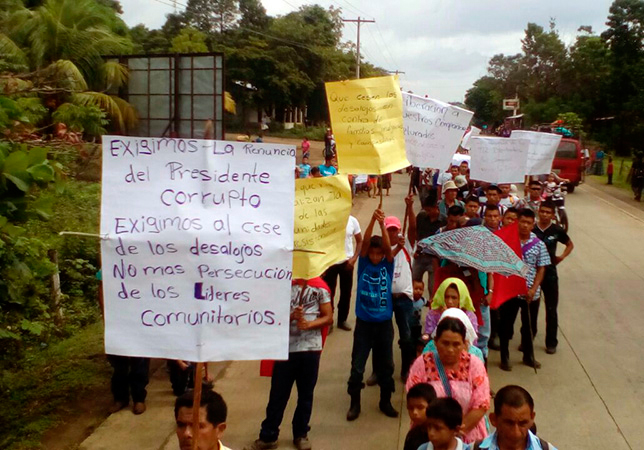
Jul 24, 2018 | Artículos, Noticias
Desde hace años, las y los defensores del departamento de Izabal han sido víctimas de persecución por oponerse al proyecto minero Fénix de la empresa guatemalteca CGN.
La CIJ visitó el departamento de Izabal del 18 al 20 de julio.
El 19 de julio, la CIJ acompañó al periodista Jerson Xitumul, quien participó en una audiencia de sobreseimiento de su caso, conjuntamente con sus abogados, en el Juzgado de Instancia Penal, Narcoactividad y Delitos contra el Ambiente de Puerto Barrios.
Posteriormente, la CIJ realizó un encuentro con la Gremial de Pescadores de Izabal, en el que recibió información acerca de la difícil situación de represión que enfrenta dicha gremial.
El 20 de julio, la CIJ sostuvo una entrevista con el Vice Presidente de la Gremial de Pescadores Eduardo Bin Poou, perseguido y detenido arbitrariamente en el centro de detención de Puerto Barrios.
La CIJ expresa su honda preocupación por la persecusión de que son víctimas los defensores de derechos humanos por el hecho de expresarse y por no estar de acuerdo con la explotación minera que se está llevando a cabo en dicho departamento, debido a que causa graves daños al medio ambiente y un daño irreparable al Lago de Izabal.
La resistencia pacífica de los pobladores de Izabal, contrasta con la persecución violenta de que son objeto.
La CIJ considera que no se trata de hechos aislados, sino de una política de persecución por parte del Estado, quien lleva a cabo estos actos ilegales para beneficiar a la empresa CGN, que explota nickel en el departamento.
En vez de proteger a los defensores de derechos humanos, el Sistema de Justicia guatemalteco ha tomado varias acciones en su contra. Así, varios periodistas pertenecientes a la Prensa Comunitaria, han sido detenidos o tienen orden de captura.
Entre ellos el caso del periodista Jerson Xitumul, cuyo caso fue finalmente sobreseído, por no existir ninguna prueba de que cometió algún hecho delictivo.
Por otro lado, recientemente fue detenido Eduardo Bin Poou, Vicepresidente de la Junta Directiva de la Gremial de Pescadores y acusado falsamente y sin pruebas de que haya cometido delito alguno.
El objetivo principal ha sido afectar a aquellos que ejercitan el derecho a la resistencia, establecido en el artículo 45 de la Constitución Política de la República de Guatemala.
Asimismo, no puede pasar desapercibido que el 27 de mayo de 2017, fue asesinado un dirigente de la Gremial de Pescadores Carlos Maas Coc y herido también el pescador Alfredo Maquín Cocul, casos que hasta el momento se encuentran impunes.
La CIJ ha señalado en varias oportunidades que las autoridades guatemaltecas criminalizan y persiguen a defensores y defensoras del derecho a la tierra, mediante la imputación del delito de usurpación y usurpación agravada.
Asimismo, la CIJ ha señalado que las autoridades guatemaltecas pretenden criminalizar el legítimo ejercicio del derecho a la resistencia, consagrado en el artículo 45 de la Constitución Política de Guatemala, acusando a los defensores del medio ambiente y otros, de delitos como instigación a delinquir, detención ilegal, amenazas, daños, reuniones y manifestaciones ilícitas y otros ilícitos.
Asimismo, esta práctica estatal penaliza y castiga el legítimo ejercicio de las libertades de expresión y reunión.
Preocupa de sobremanera a la CIJ, el papel que juegan las y los jueces en el departamento de Izabal, en la criminalización de defensoras y defensores de derechos humanos.
Un ejemplo lo constituye el caso del Juez Edgar Aníbal Arteaga López, quien utilizando la función pública, suele abusar del poder de que está investido e imponer castigos ejemplares a los defensores de derechos humanos.
Así, con sus resoluciones arbitrarias dicho juez ha afectado a periodistas, pescadores organizados en la Gremial de Pescadores, dirigentes comunitarios, defensores del derecho a la tierra y todo aquel que se opone a la explotación de níquel o que defiende los derechos colectivos de las comunidades en dicho departamento.
Asimismo, en otros casos defensores y defensoras de derechos humanos han sido criminalizados y existe un número considerable de órdenes de captura en todo el país, que afectan a personas que ejercitan el derecho a la libertad de expresión, para defender derechos comunitarios.
Ramón Cadena, Director de la CIJ expresó:
“Urge que el Estado de Guatemala detenga la criminalización y persecución de que son objeto dirigentes comunitarios, periodistas y en general defensores y defensoras de derechos humanos en el departamento de Izabal. Para ello, se debe aplicar el régimen disciplinario interno a jueces que con su actuación, contribuyen a perseguir a estas personas, sólo por su forma de pensar y por ejercer legítimamente sus derechos y libertades. El Estado de Guatemala, deberá reparar los daños y perjuicios causados a defensoras y defensores de derechos humanos, por la actuación de sus autoridades y la CICIG debería investigar estos hechos, para aclarar la verdad de lo sucedido.”
Guatemala-Criminalización Izabal-News-2018-SPA (artículo completo, en PDF)
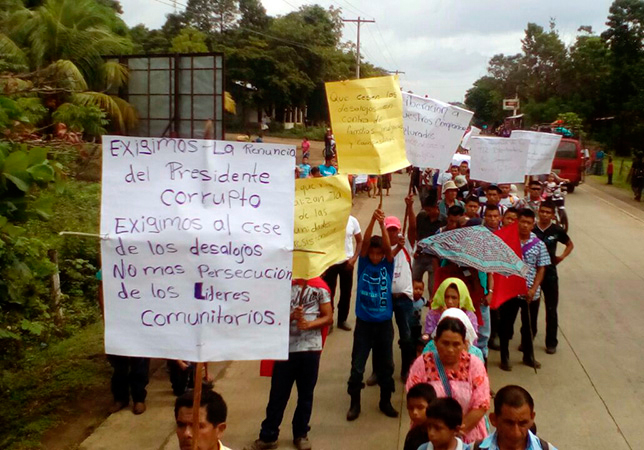
Jul 24, 2018 | News
For many years, human rights defenders in Izabal have been the victims of persecution because of their opposition to the Phoenix nickel mining project.
This project has been operated by the Guatemalan Nickel Company (CGN), formally owned by Hudbay and now owned by the Solway Group.
“The ICJ expresses its deep concern about the persecution of human rights defenders opposing to nickel mining operations that are causing serious environmental damage and irreparable harm to the Lake of Izabal.
The local communities’ peaceful resistance contrasts with the violent repression that they face,” Ramon Cadena, Director of the Central American Office of the ICJ, said today.
Ramon Cadena added: “the Guatemalan government must urgently put an end to the criminalization and persecution of community leaders, journalists and all human rights defenders in the Department of Izabal.
Internal disciplinary measures should be taken against judges who through their acts contribute to the persecution of persons exercising their legitimate rights and freedoms.
The State should provide reparations for the harm and prejudice caused to human rights defenders by the public authorities. Furthermore, the International Commission against Corruption and Impunity in Guatemala (CICIG) should fully investigate these acts.“
Eduardo Bin Poou, Vice-President of the Izabal Fishers’ Association was recently detained and falsely accused without any evidence that he had committed any crime.
Last year, on 27 May 2017, Carlos Maas Coc, a leader of the Fishers’ Association was assassinated, and another fisherman, Alfredo Maquín Cocul, was wounded and these crimes remain in impunity today.
From 18-20 July, 2018, the ICJ carried out a visit to the Department of Izabal. On 19 July, the ICJ observed the hearing when the case against Jerson Xitumul, a community journalist, was dismissed for lack of evidence of any wrongdoing, at the Court for Criminal, Narcotics and Environmental Offences in Puerto Barrios.
The ICJ then held a meeting with the Izabal Fishers’ Association and on 20 July, the ICJ interviewed the Vice President of the same Association, Eduardo Bin Poou, arbitrarily detained in the Puerto Barrios prison.
The ICJ is deeply concerned by the role that judges in the Department of Izabal have played in the criminalization of human rights defenders.
Judge Edgar Aníbal Arteaga López has often abused his office by imposing exemplary punishments against human rights defenders.
This judge has handed down arbitrary sentences against journalists, fishermen, community leaders, land rights’ defenders and all those opposed to the nickel operations or who defend community rights in the Department.
For example, because of the arbitrary actions of Judge Arteaga, the community leader, Abelardo Chub Caal, remains in detention although there is no evidence that he has committed any crime.
There are other cases including that of Maria Magdalena Cuc Choc, from the Chabilchoch community, who was detained on 17 January 2018 in Puerto Barrios.
The single Judge for Criminal Proceedings, Narcotics and Environmental Offences in Puerto Barrios, Ana Leticia Peña Ayala, despite the evidence, absolved the retired Colonel Mynor Ronaldo Padilla González (former chief of security for the CGN nickel company) of all charges and ordered his immediate liberty.
During the court case, the Judge Peña Ayala prohibited the public and journalists from entering the court room for so-called “security reasons”, so that most of the proceedings were carried out behind closed doors. With this ruling, the assassination of Adolfo Ich remains in impunity and those responsible have not been punished.
In this same case, Germán Chub was left quadriplegic and the circumstances of the attack against him have never been resolved.
In the hearing on 19 July in the case of Jerson Xitumul, without any justification, Judge Arteaga also prohibited the presence of journalists and international and national observers in the court room.
Both judges flagrantly violated the principle of public hearings established in the Guatemalan Penal Code. A formal complaint was submitted to the Auxiliary of the Human Rights Attorney of the Department of Izabal concerning the actions of Judge Arteaga on 19 July.
The ICJ has stated on a number of occasions that the Guatemalan authorities have persecuted human rights defenders by charging them with crimes of land appropriation or aggravated land appropriation.
In this way, the Guatemalan authorities seek to criminalize the legitimate right to resist, enshrined in article 45 of the Guatemalan Constitution, accusing environmental human rights defenders and others of crimes such as incitement to crime, illegal detention, threats, damages, illicit meetings and marches and other acts. In practice, the State is penalizing the legitimate exercise of the rights of expression and association.
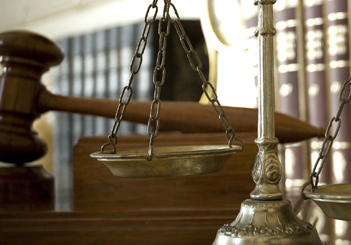
Jul 22, 2018 | News
The Supreme Court’s election of a person who is not suitable for the position of substitute judge on the Constitutional Court is deeply concerning for the sound administration of justice and the effective application of the rule of law, the ICJ said today.
Ramon Cadena, the Director of the Central American office of the ICJ added: “with this election, the SCJ has contributed to deepening the crisis in the judicial system and it will affect the little credibility that the Guatemalan people still retain in the justice system.”
The position of substitute judge on the Constitutional Court (CC) had become vacant when the former substitute judge was appointed Attorney General by the President, Jimmy Morales.
The eight judges of the SCJ who voted in favour of the substitute judge of the CC did not comply with international norms and standards on the administration of justice.
The Basic Principles on the Independence of the Judiciary state that “Persons selected for judicial office shall be individuals of integrity and ability with appropriate training or qualifications in law.”
The ICJ has been able to verify that the SCJ judges elected a person who:
- in 2010 was dismissed as Attorney General by the CC shortly after assuming office because the person was deemed not suitable;
- openly opposes the International Commission against Corruption and Impunity (ICCIG) despite the good work that the Commission undertakes to address corruption and impunity;
- in 2010, after assuming the office of Attorney General was accused of intervening in cases concerning corruption and impunity and impairing evidence in these cases.
The ICJ recalls that the CC stated that the acts carried out by Congress on 11 September 2017 were susceptible of causing “irreparable harm to the justice system”.
The ICJ considers that the election by the SCJ of the substitute judge to the CC should also be considered an act of irreparable harm to the justice system.
The ICJ therefore urges the CC to once again protect the rule of law in Guatemala.
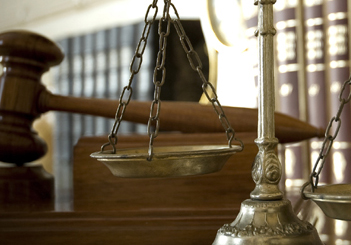
Jul 22, 2018 | Artículos, Noticias
La reciente elección del magistrado suplente de la Corte de Constitucionalidad, llevada a cabo por la Corte Suprema de Justicia (CSJ), pone en grave riesgo la justicia constitucional y su imparcialidad.
En efecto, días atrás, la Corte Suprema de Justicia eligió al magistrado suplente de la Corte de Constitucionalidad (CC), puesto que había quedado vacante luego de que la magistrada suplente anterior, fuese electa como Fiscal General por el Presidente de la República.
Los ocho magistrados de la CSJ que votaron a favor del profesional electo como magistrado suplente de la Corte de Constitucionalidad, no han observado las normas y estándares internacionales en materia de administración de justicia.
Los Principios Básicos relativos a la Independencia de la Judicatura estipulan que “Las personas seleccionadas para ocupar cargos judiciales serán personas íntegras e idóneas y tendrán la formación o las calificaciones jurídicas apropiadas.”
No obstante, la CIJ ha podido constatar que los magistrados de la CSJ nombraron a una persona:
a) que en el año 2010, fue destituido como Fiscal General por la propia Corte de Constitucionalidad cuando recién había asumido el cargo, por haber sido considerado una persona no idónea para ocupar tan importante cargo;
b) que abiertamente ha estado en contra de la presencia de la Comisión Internacional contra la Impunidad (CICIG) en el país, a pesar del buen trabajo que ha realizado dicha comisión en la lucha contra la impunidad y la corrupción;
c) que en el 2010, ya en su calidad de Fiscal General y luego de asumir el cargo, fue acusado de afectar casos relacionados con la lucha contra la corrupción e impunidad y de intervenir y afectar la prueba existente en dichos casos.
Por ello, en esta elección, la CIJ tiene hondas y legítimas preocupaciones sobre la verdadera voluntad de la Corte Suprema de Justicia de: a) tramitar un genuino y necesario proceso de depuración del Sistema de Justicia; y b) de apoyar las reformas constitucionales que vendrían a fortalecer el Sistema de Justicia.
Además, con esta elección, la CSJ ha contribuido a profundizar la crisis del Sistema de Justicia; su decisión viene a afectar la poca credibilidad que la población guatemalteca aún tiene en el Sistema de Justicia.
Debemos recordar que los actos del Congreso de la República del 11 de septiembre de 2017, llevaron a la Corte de Constitucionalidad a catalogarlos como actos susceptibles de causar “un daño irreparable a la justicia” en Guatemala.
Es opinión de la CIJ, que la elección del magistrado suplente de la Corte de Constitucionalidad, llevada a cabo por la Corte Suprema de Justicia, también debe ser considerada como una forma de causar un daño irreparable a la justicia.
Por ello, la CIJ tiene la esperanza de que la Corte de Constitucionalidad protegerá, una vez más, el Estado de Derecho en Guatemala.
Ramón Cadena, Director para Centro América de la CIJ expresó: “El acto de la Corte Suprema de Justicia de elegir a una persona que no es idónea para el cargo de magistrado suplente de la Corte de Constitucionalidad, resulta altamente preocupante para una recta administración de justicia y la vigencia efectiva del Estado de Derecho en Guatemala”.









